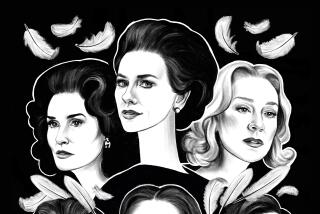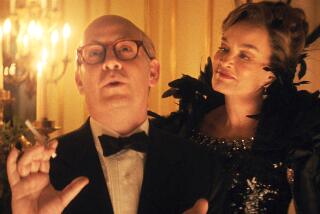STAGE REVIEW : ‘Tru’ to Life : Robert Morse’s uncanny portrayal of Truman Capote at the Henry Fonda Theatre re-creates the external Capote--but also captures the man within.
- Share via
Truman Capote was not everybody’s idea of heaven, least of all his own. The late author of such best sellers as “In Cold Blood” and “Breakfast at Tiffany’s” was a funny-looking, physically stunted man, yanked up by the bootstraps of his talent and a shrill determination to be eccentric and defiant.
It is this Tru we discover in “Tru,” the one-man play about Capote that opened Friday at the Henry Fonda Theatre in Hollywood. Written and directed by Jay Presson Allen and uncannily portrayed by Robert Morse, it comes clamorously preceded by the acclaim it won for Morse in Boston and on Broadway.
More accurately, it is Tru on the edge that we discover--court jester to the rich and famous at a turning point. The time is Christmas, 1975, when Capote, having allowed Esquire magazine to publish indiscreet chapters from his unfinished roman a clef, “Answered Prayers,” finds himself rejected by his targeted friends.
No one could have been more surprised. And when forgiveness did not come in due course, surprise turned to dismay. What are a few naked truths? Surely not enough to ruin a friendship. “All my life,” says Morse as the uncomprehending Capote, “I’ve told things about myself that would make a baboon blush blue.” Didn’t those people understand they were talking to an artist? Isn’t all fair in war and art?
We find Capote on stage just as this situation is beginning to sink in. He is trying to come to grips with it and with some other emotional complications of the holiday season, such as departed friends and lovers and the memory of his mother’s Christmas Day suicide. “Christmas in New York might be for Frank Capra,” he quips, “but it tends to go astray for me.” The tone is dry, the mood witty and sober (vodka notwithstanding). Color it indigo. He is in the living room of his apartment at United Nations Plaza in New York, in front of a spectacular view of the East River framed by a wall of glass. (The set is by David Mitchell.)
Nothing much happens. Capote just talks--to us, to himself, into the phone. But a portrait emerges. And by play’s end, when he puts on his trademark black broad-brimmed hat and shades and walks out the door, we have glimpsed the interior man--the one who will eventually shoot down his pain in an increasingly gaudy display of self-parody.
But not today. Allen’s script is intentionally fixed on Capote before he skidded into his decline. It is not maudlin, though the self-deprecation is discernable behind the words. The writing is wry, economical, skillfully indirect, acerbic and when called upon, judiciously vulgar.
The achievement, however, is hard to separate from Morse’s stunning contribution. His eerie cloning of Capote, behind the duplication of Kevin Haney’s make-up and under Paul Huntley’s balding wig, is much more than latex deep. He re-creates the external Capote--from the fluty voice to the overblown effeteness, with its flailing hands, flickering tongue and other grimaces--but there is a real person within.
Morse has matured in the role since his early performances at Harvard’s Hasty Pudding in 1989, but at some danger to spontaneity, particularly in Act I where the line between character and caricature is easier to cross. The danger vanishes, however, in the second half, where the interior life of the man reveals itself more candidly and has been enlarged and enriched: a soft-shoe routine is now more of a crumble; a devastating reminiscence barely avoids tears; a Capote portrait gets punched in the nose--the play’s only act of overt self-hatred.
Small craft warnings in a play subtly filled with them. It’s a remarkable sketch painted in indelible Morse ink.
‘Tru’
Robert Morse: Truman Capote
A one-man play written and directed by Jay Presson Allen. Producers Lewis Allen and David Brown with Suntory International Corp. and the Shubert Organization in association with Landmark Entertainment Group. Set David Mitchell. Lights Ken Billington, Jason Kantrowitz. Costumes Sarah Edwards. Make-up Kevin Haney. Wig Paul Huntley. Sound Otts Munderloh. Stage manager Mary Porter Hall.
More to Read
The biggest entertainment stories
Get our big stories about Hollywood, film, television, music, arts, culture and more right in your inbox as soon as they publish.
You may occasionally receive promotional content from the Los Angeles Times.










